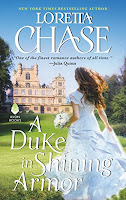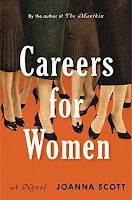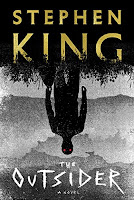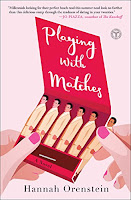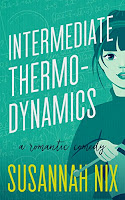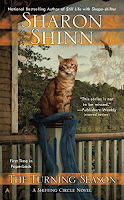Bliss, by Judy Cuevas
>> Tuesday, May 31, 2005
While I read Dance, by Judy Cuevas a few years ago, it took me a while to get a copy of the book that came before that, Bliss.
I can't find a summary anywhere online and I can't copy the blurb either, since the first thing I did when I finished Bliss was to make a friend read it, too, so here's one of the amazon reviews:
Bold, brave and charmingly naive, Hannah Van Evan longed for nothing more than to leave her old life behind and run away to Paris. She finds her chance in the form of Madame Amelia Besom. A grumpy, yet kind old woman, Mrs Besom needs a secretary/companion to accompany her to an old French chateau. There, the two women would work to recover any valuable art that could be sold at auction.The best thing about Bliss? It's a toss-up between the characters and the actual writing. Whatever, it's an A, and not counting rereads of favourites, this is only the second book I've given such a high grade this year. The other one was Kinsale's Shadowheart, and so far, there have been no A+.
Nardi de Saint Valliers life was a mess - it was no longer his own. A recovering ether-drinker, Nardi is under lock and key in an old cottage on the grounds of the family chateau. Here, he is watched by his older brother - Much depends on Nardis recovery. Too numb to stand up and fight for himself and his freedom, Nardi willingly(though broodingly)gives in to his familys manipulations....until the unexpected arrival of Hannah. When she comes into his life, Nardi is shocked and pleased to discover that she has brought feeling back to him...and once Nardi accepts Hannahs love and offers his in return, he is unwilling to give her up for anyone or anything - not even his own disapproving family.
Nardi. Oh, Nardi! ::sigh:: An addict is probably the least likely guy who could make a dreamy hero for me, but Nardi manages it. He's just so f. charming!
As for his addiction, the main reason reading about this was bearable was that he wasn't at all in denial. He knows he's an addict, but he simply doesn't see it as a problem, because he doesn't care what happens. As the book starts, he seems to be in a state where he doesn't really have a physical need for his drug of choice any more. He just doesn't want to be sober, he doesn't find any enjoyment in life and so wants the ether so that he can sleep and sleep. His charm at the beginning of the book is that of the addict who is trying to manipulate people, actually.
With Hannah, he starts really coming back to life. He starts finding pleasure again in life, both in the sexual realm and outside of it, and reading these sections is really powerful stuff!
What I liked about Hannah is that Cuevas has created in her a character who isn't perfect. She likes pretty things, she craves them, in fact. And her head is turned by a handsome, charming man. A character who easily refuses to marry a rich man because she doesn't love him, or gives up everything for love and isn't even tempted, well, that's a bit boring. In Hannah's case, she might make those same choices, but she IS tempted. And she's even has enough self-awareness that she forces herself to burn her bridges to make sure she won't give in to that temptation. She does get mad that she isn't getting the sexy guy and all that wonderful money, at the unfairness of it all, even as she knows that well, that's life and there are no guarantees.
There aren't all that many extra important characters here. It's not a very crowded book. The two most important secondaries, Nardi's brother Sébastien and Hannah's boss, Mrs. Besom, are beautifully written, in shades of gray. I wouldn't call Sébastien the villain of the piece, he's more an antagonist. He IS trying to keep Nardi and Hannah apart, but he's not doing this out of purely selfish reasons. He truly does believe he's doing the best for Nardi. And the portrayal of Mrs. Besom as torn between her liking for Hannah and her very strict notions of what she should do is excellent.
And the writing! Just as wonderful as I've come to expect from this author. She doesn't just paint a picture for us, reading this book is an experience that involves all five senses. In my mind, I saw the chateau, I smelled Nardi's ether, I felt his alpaca coat, I tasted the pastry Hannah brought Nardi but ended up eating herself, I heard the scarlet canopy set up for the auction fluttering in the wind.
The only thing that kept this book from getting an A+ grade was that I thought the ending was a bit too rushed and abrupt. This has happened to me with this author's books a few times before. The worst I can remember was in Beast, where it almost ruined the book for me. Bliss' ending wasn't that bad, but it wasn't the wonderful ending that would be fitting for such an amazing book. Read more...




